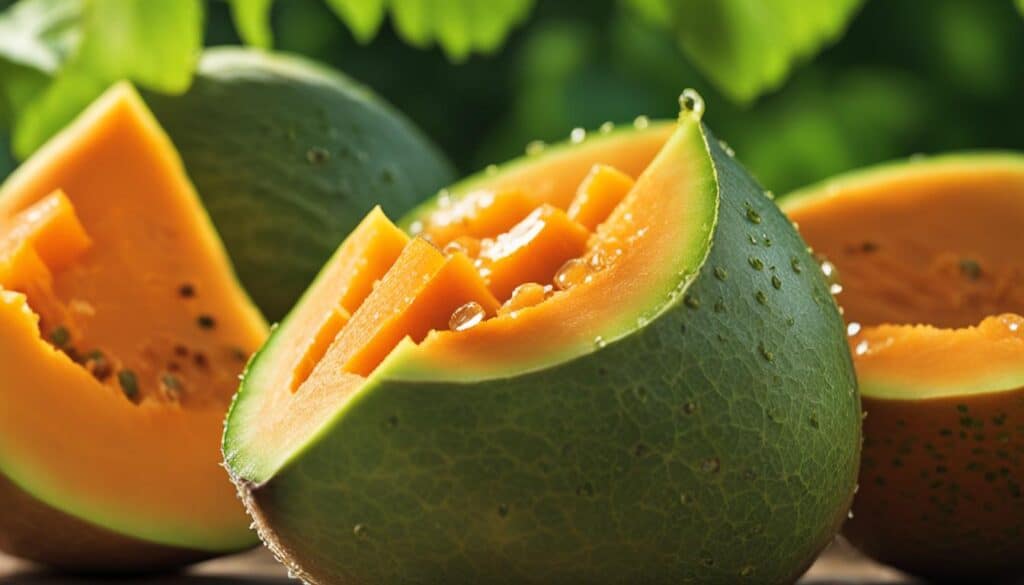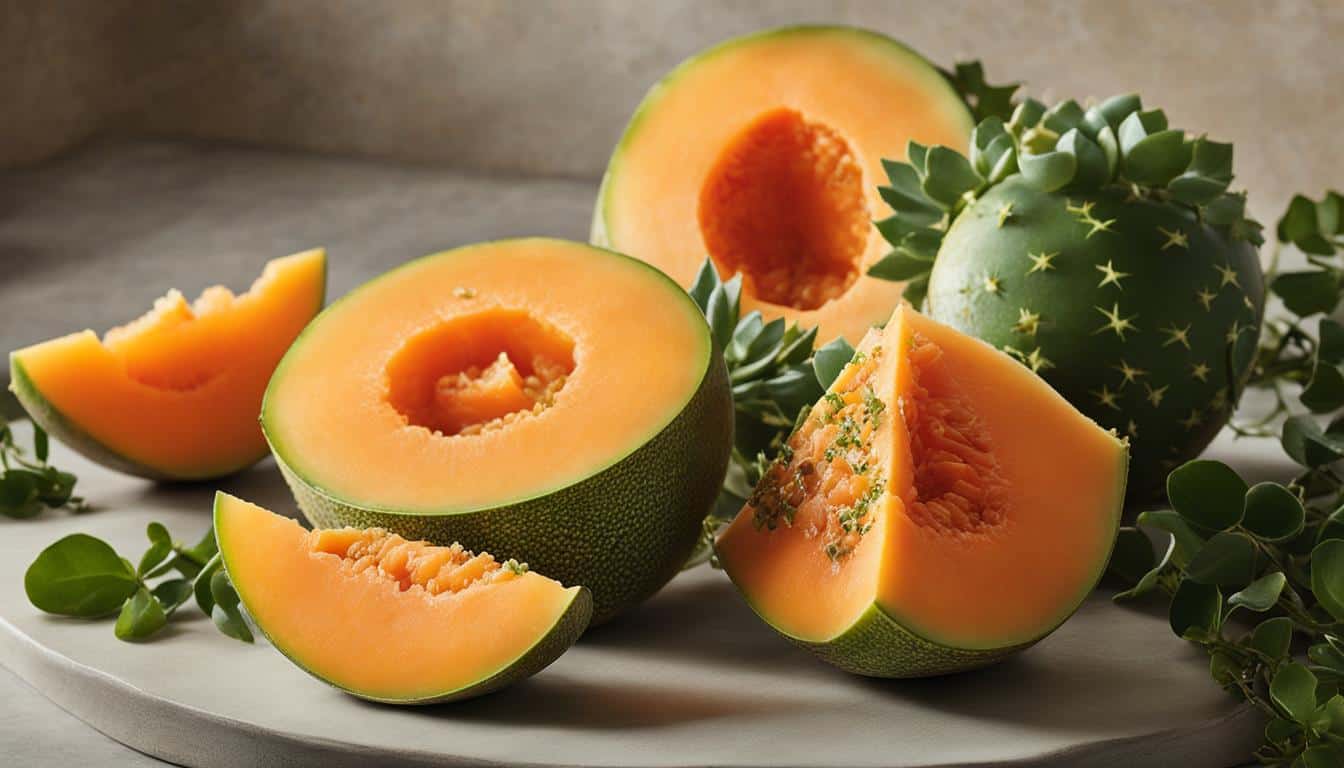I have always been captivated by the vibrant world of fruits, each one possessing its own unique flavors and health benefits. Among these delightful offerings, one that truly stands out is the cantaloupe fruit. Oh, the juicy and succulent flesh of this magnificent fruit never fails to tantalize my taste buds and leave me feeling refreshed and rejuvenated. Join me on a journey as we explore the wonders of cantaloupe and uncover its many secrets.
Scientifically known as Cucumis melo, cantaloupe is a nutritional powerhouse that packs a punch in terms of health benefits. Loaded with vitamins C and A, this fruit is an excellent source of immune-boosting nutrients. Not only that, but cantaloupe also boasts a high water content, making it incredibly hydrating. It supports digestion, promotes heart health, and so much more. Let’s dive deeper into the world of cantaloupe and discover why it deserves a place on your plate.
Key Takeaways:
- Cantaloupe is a juicy and succulent fruit that offers a range of health benefits.
- It is packed with vitamins C and A, making it an excellent choice for boosting your immune system.
- The high water content of cantaloupe helps keep you hydrated.
- Cantaloupe supports digestive health and promotes a healthy heart.
- Including cantaloupe in your diet can contribute to improved skin health and vitality.
A Nutrient-Rich Marvel
Cantaloupe, also known as Cucumis melo, is a true marvel when it comes to nutritional value. This succulent fruit is packed with essential vitamins and minerals that support overall health and well-being.
One of the standout nutrients in cantaloupe is vitamin C, a powerful antioxidant that plays a crucial role in immune function. Vitamin C helps protect the body against harmful free radicals and promotes collagen production, which is essential for maintaining healthy skin and connective tissues.
Another noteworthy nutrient found in cantaloupe is vitamin A. This vitamin is important for maintaining good vision, supporting healthy skin, and bolstering the immune system. Including cantaloupe in your diet can help ensure an adequate intake of these essential vitamins.
A Nutrient Comparison
| Nutrient | Cantaloupe (1 cup, diced) | Oranges (1 medium) |
|---|---|---|
| Vitamin C | 67.7mg | 69.7mg |
| Vitamin A | 2704 IU | 2526 IU |
As shown in the table above, cantaloupe is a close competitor to oranges in terms of vitamin C and vitamin A content. It’s clear that cantaloupe is a nutrient-rich fruit that can be a valuable addition to a healthy diet.
So the next time you’re looking for a juicy and delicious snack that’s packed with essential vitamins, reach for a refreshing slice of cantaloupe!
Hydration at its Best
Cantaloupe is not only a delicious summer fruit but also a natural hydrator. With its high water content of over 90%, cantaloupe can help you maintain proper hydration levels, especially during hot weather or after physical activities. Staying hydrated is essential for our bodies as it supports various functions such as digestion, circulation, and temperature regulation.
Not only does cantaloupe help quench your thirst, but it also provides essential nutrients while hydrating your body. This juicy fruit is packed with vitamins, minerals, and antioxidants that contribute to overall health and well-being.
Whether you enjoy cantaloupe on its own, add it to fruit salads, or blend it into refreshing smoothies, this hydrating fruit is a tasty and nutritious way to stay hydrated during the summer months or after a strenuous workout. So, grab a slice of juicy cantaloupe and enjoy the refreshing goodness it brings!
| Nutrient | Amount per 100g |
|---|---|
| Water | 90.15g |
| Energy | 34 kcal |
| Protein | 0.84g |
| Fat | 0.19g |
| Carbohydrate | 8.16g |
| Fiber | 0.9g |
| Sugar | 7.86g |
| Vitamin C | 36.7mg |
| Vitamin A | 169µg |
| Potassium | 267mg |
Hydration Tips:
- Include cantaloupe as part of your daily fruit intake to boost hydration.
- Drink plenty of water alongside consuming cantaloupe for optimal hydration.
- Get creative with cantaloupe by adding it to salads, smoothies, or even freezing it for a refreshing summer treat.
- Stay mindful of your body’s fluid needs and hydrate accordingly, especially during exercise or in hot weather.
A Dietary Fiber Friend: Unlocking the Digestive Benefits of Cantaloupe Fruit

When it comes to supporting digestive health, cantaloupe fruit is a true dietary fiber friend. Packed with this essential nutrient, cantaloupe offers a range of benefits for your digestive system. From regulating bowel movements to promoting a healthy gut microbiome, incorporating cantaloupe into your diet can contribute to improved digestion and reduce the risk of gastrointestinal issues.
The dietary fiber content of cantaloupe helps to add bulk to the stool, making it easier to pass through the digestive tract. This not only helps prevent constipation but also supports regularity and overall gut health. Additionally, the fiber in cantaloupe acts as a prebiotic, providing nourishment for the beneficial bacteria in your gut. A healthy gut microbiome is essential for optimal digestion, nutrient absorption, and immune function.
Furthermore, cantaloupe is a low-calorie and low-fat fruit, making it a healthy choice for those looking to maintain or lose weight. The fiber in cantaloupe aids in promoting feelings of fullness, reducing the likelihood of overeating. By including cantaloupe in your diet, you can support both digestive health and weight management goals.
So why not embrace the delicious and nutritious benefits of cantaloupe fruit? Whether enjoyed on its own, added to fruit salads, or incorporated into refreshing smoothies, there are countless ways to savor this fiber-rich delight. Make cantaloupe a part of your daily routine and unlock the digestive benefits it has to offer.
Antioxidant Armor
Cantaloupe’s vibrant orange hue signifies the presence of beta-carotene, a potent antioxidant. Beta-carotene helps neutralize harmful free radicals, reducing oxidative stress and the risk of chronic diseases such as certain types of cancer and cardiovascular issues. Antioxidants like those found in cantaloupe are essential for promoting long-term health and vitality.
Research has shown that beta-carotene, a carotenoid pigment found in cantaloupe, acts as a powerful antioxidant in the body. Antioxidants help protect cells from damage caused by free radicals, which are unstable molecules that can contribute to the development of chronic diseases and accelerate the aging process. By scavenging free radicals, beta-carotene helps to reduce oxidative stress and lower the risk of various diseases.
In addition to beta-carotene, cantaloupe also contains other antioxidants, such as vitamin C, which further contributes to its protective effects. Vitamin C is known for its immune-boosting properties and its ability to support collagen production, making it essential for healthy skin, connective tissues, and blood vessels. Combining the antioxidant power of beta-carotene with the immune support of vitamin C, cantaloupe offers a dynamic duo of health benefits.
By including cantaloupe in your diet, you can enjoy the protective benefits of its antioxidant armor. Whether sliced and enjoyed on its own or added to fruit salads, smoothies, or grilled dishes, cantaloupe provides a delicious and nutritious way to support your overall well-being.
Weight Management Wonder
When it comes to maintaining a healthy weight, cantaloupe fruit is a fantastic choice. Despite its sweet taste, cantaloupe is relatively low in calories and fat, making it a satisfying snack option for those aiming to manage their weight. Each juicy bite of cantaloupe provides a burst of flavor and nutrition without weighing you down.
One of the reasons cantaloupe is a weight management wonder is its high fiber content. Fiber is known for promoting feelings of fullness, helping to curb cravings and prevent overeating. Incorporating cantaloupe into your diet can help you stay satisfied and on track with your weight goals.
In addition to being low in calories and high in fiber, cantaloupe is also a hydrating fruit. With a water content of over 90%, cantaloupe helps keep you feeling refreshed and satisfied, reducing the likelihood of turning to high-calorie snacks. So, next time you’re looking for a nutritious and delicious treat that won’t derail your weight management efforts, reach for a juicy slice of cantaloupe!
Table: Nutritional Content of Cantaloupe
| Nutrient | Amount per 100g |
|---|---|
| Calories | 34 |
| Protein | 0.8g |
| Fat | 0.2g |
| Carbohydrates | 8.2g |
| Fiber | 0.9g |
| Vitamin C | 36.7mg |
| Vitamin A | 3382IU |
| Potassium | 267mg |
Source: USDA FoodData Central
Heart Health Hero
When it comes to promoting heart health, incorporating cantaloupe into your diet is a wise choice. This delicious fruit is packed with nutrients that can support a healthy cardiovascular system. One of the key components of cantaloupe that contributes to heart health is potassium. Potassium plays a vital role in maintaining healthy blood pressure levels, which is essential for a well-functioning heart.
In addition to its potassium content, cantaloupe is also rich in fiber. Dietary fiber helps manage cholesterol levels by reducing the absorption of LDL cholesterol, often referred to as “bad” cholesterol. By incorporating cantaloupe into your diet, you can take a proactive approach in maintaining healthy cholesterol levels.
Furthermore, cantaloupe’s high water content of over 90% makes it a hydrating fruit that can help maintain proper fluid balance in the body. Staying hydrated is crucial for optimal heart function, as it ensures adequate blood volume and circulation.
Maintaining a Healthy Heart: The Role of Potassium
Potassium is an essential mineral that plays a vital role in maintaining heart health. It helps regulate the electrical impulses that control the heart’s rhythm and supports proper muscle function. Adequate potassium intake has been associated with a reduced risk of hypertension, stroke, and other cardiovascular diseases.
“A diet rich in potassium-containing foods, such as cantaloupe, can help maintain healthy blood pressure levels and promote overall heart health.”
It’s important to note that potassium works in synergy with other nutrients, such as magnesium and calcium, to support a healthy heart. Therefore, incorporating a variety of potassium-rich foods, like cantaloupe, along with a balanced diet, is key to reaping the benefits for your cardiovascular health.
| Food | Potassium Content (per 100g) |
|---|---|
| Cantaloupe | 267mg |
| Banana | 358mg |
| Spinach | 558mg |
| Avocado | 485mg |
As shown in the table, cantaloupe is an excellent source of potassium, providing approximately 267mg per 100g serving. Including this delicious fruit in your daily meals and snacks can be a flavorful way to support your heart health.
Supporting Skin Vitality

When it comes to maintaining healthy and glowing skin, cantaloupe fruit is a true champion. Packed with essential vitamins and nutrients, this delicious fruit can nourish your skin from the inside out. The combination of vitamins A and C found in cantaloupe makes it a natural supporter of skin health, helping to combat common skin issues and promote a radiant complexion.
Vitamin A, also known as retinol, plays a crucial role in skin cell production and repair. It helps to maintain the integrity of the skin’s outermost layer, promoting a smoother texture and reducing the appearance of fine lines and wrinkles. Regular consumption of cantaloupe, which is rich in vitamin A, can support the overall health and vitality of your skin.
Additionally, cantaloupe is a fantastic source of vitamin C, a powerful antioxidant that is essential for collagen synthesis. Collagen is a protein that provides structure and elasticity to the skin, helping to maintain its youthful appearance. By boosting collagen production, vitamin C helps to reduce the signs of aging, such as sagging and dullness, and promotes a more vibrant complexion.
| Vitamins | Cantaloupe |
|---|---|
| Vitamin A | High |
| Vitamin C | Abundant |
By incorporating cantaloupe into your diet, you can provide your skin with the necessary vitamins and nutrients it needs to thrive. Whether enjoyed on its own, added to a fruit salad, or blended into a refreshing smoothie, cantaloupe offers a delicious and healthful way to support your skin’s vitality.
So, the next time you’re looking to enhance your skincare routine, don’t forget to include cantaloupe. This delightful fruit is not only a tasty treat but also a valuable ally in maintaining healthy, radiant skin.
Incorporating Cantaloupe into Your Diet

Are you looking for delicious and nutritious ways to enjoy cantaloupe? Look no further! This versatile fruit can be enjoyed in various ways, adding a burst of flavor and health benefits to your meals. Here are some delicious cantaloupe recipes to inspire your culinary adventures:
1. Cantaloupe Smoothie Bowl
Start your day off right with a refreshing and filling cantaloupe smoothie bowl. Simply blend ripe cantaloupe chunks with your favorite plant-based milk, such as almond milk or coconut milk. Pour the smoothie into a bowl, and top it with granola, fresh berries, and a sprinkle of chia seeds for added texture and nutrition. This vibrant and Instagram-worthy breakfast will keep you energized throughout the morning.
2. Grilled Cantaloupe Salad
Elevate your summer salads with a unique twist by grilling slices of cantaloupe. The heat intensifies the fruit’s sweetness and adds a smoky flavor. Combine the grilled cantaloupe with arugula, fresh mozzarella, cherry tomatoes, and a drizzle of balsamic glaze. This savory and sweet salad is a perfect side dish for barbecues or a light lunch.
3. Cantaloupe Salsa
Spice up your meals with a refreshing and tangy cantaloupe salsa. Dice cantaloupe, cucumber, red onion, and jalapeño peppers. Mix them together with lime juice, cilantro, and a pinch of salt. This vibrant salsa pairs well with grilled chicken, fish tacos, or as a refreshing dip with tortilla chips. It’s a delightful combination of flavors that will impress your taste buds.
These are just a few examples of how you can incorporate cantaloupe into your daily meals. Get creative and experiment with this delicious fruit to discover your own favorite recipes. Cantaloupe’s natural sweetness and nutritional benefits make it a delightful addition to any dish.
Conclusion
In conclusion, cantaloupe fruit is a delicious and nutritious addition to any diet. With its refreshing flavor and high water content, it not only satisfies the taste buds but also keeps the body hydrated. Cantaloupe is a true powerhouse of health benefits, making it a fantastic choice for both taste and well-being.
One of the key advantages of cantaloupe fruit is its rich vitamin and mineral content, including vitamins C and A. These essential nutrients support immune function, skin health, and overall vitality. Additionally, cantaloupe is packed with dietary fiber, which aids in digestion, prevents constipation, and promotes a healthy gut.
Moreover, cantaloupe’s vibrant orange color indicates the presence of beta-carotene, a potent antioxidant. Antioxidants like beta-carotene help protect the body against oxidative stress and reduce the risk of chronic diseases.
When it comes to maintaining a healthy weight, cantaloupe is a wonderful ally. With its low calorie and fat content, it serves as a satisfying snack option. The fiber in cantaloupe also helps keep you feeling full, reducing the temptation to overeat.
Whether enjoyed on its own, blended into smoothies, or added to various dishes, cantaloupe is incredibly versatile. With its many health benefits and delicious taste, it’s easy to see why cantaloupe fruit is a fantastic choice for enhancing your well-being. So, next time you’re looking for a sweet and healthy treat, reach for a juicy slice of cantaloupe and savor the goodness it brings.
FAQ
What are the health benefits of cantaloupe fruit?
Cantaloupe fruit is packed with vitamins C and A, which support immune function, skin health, and promote wound healing. It is also hydrating, supports digestive health, and promotes heart health.
How does cantaloupe fruit contribute to hydration?
Cantaloupe fruit has a high water content of over 90%, making it a natural hydrator. Incorporating cantaloupe into your diet can help maintain proper hydration levels, especially during hot weather or after physical activities.
What role does cantaloupe fruit play in digestive health?
Cantaloupe fruit is rich in dietary fiber, which helps regulate bowel movements, prevents constipation, and promotes a healthy gut microbiome. Including cantaloupe in your diet can contribute to improved digestion and a reduced risk of gastrointestinal issues.
What antioxidants are present in cantaloupe fruit?
Cantaloupe fruit contains beta-carotene, a potent antioxidant. Beta-carotene helps neutralize harmful free radicals, reducing oxidative stress and the risk of chronic diseases such as certain types of cancer and cardiovascular issues.
Can cantaloupe fruit help with weight management?
Despite its sweet taste, cantaloupe fruit is relatively low in calories and fat, making it a satisfying snack option for those aiming to maintain or lose weight. The fiber content in cantaloupe can also promote feelings of fullness, reducing the likelihood of overeating.
How does cantaloupe fruit support heart health?
Cantaloupe fruit contains significant amounts of potassium, which plays a vital role in maintaining healthy blood pressure levels. The fruit’s fiber content can also help manage cholesterol levels, further reducing the risk of cardiovascular diseases.
What benefits does cantaloupe fruit offer for skin health?
Cantaloupe fruit’s combination of vitamins A and C makes it a natural supporter of skin health. Vitamin A promotes skin cell production and repair, while vitamin C supports collagen synthesis, keeping the skin youthful and resilient. Regular consumption of cantaloupe can contribute to a glowing complexion and a reduction in skin-related issues.
How can I incorporate cantaloupe fruit into my diet?
Adding cantaloupe to your daily routine is easy and enjoyable. Whether you prefer to enjoy it on its own, blend it into smoothies, add it to fruit salads, or even grill it for a unique twist, cantaloupe’s versatility makes it easy to integrate into various dishes. There are countless delicious cantaloupe recipes available to explore and savor.





Leave a Reply